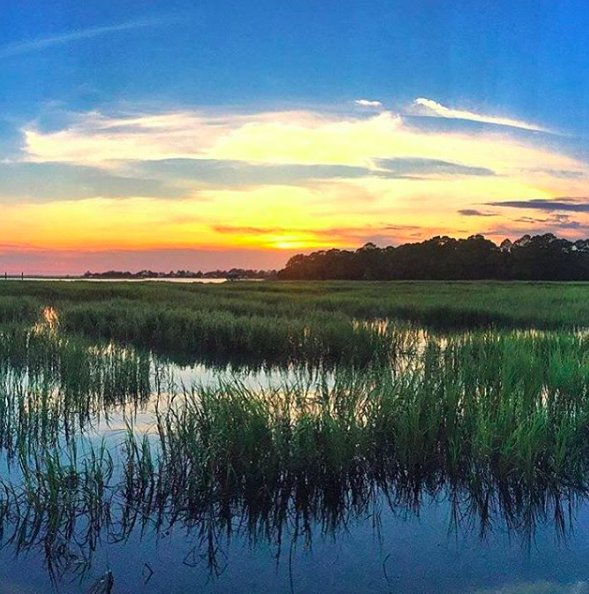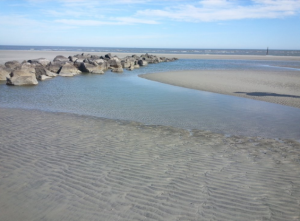
photo by @vacationontybee
The Rhythm of Life
Last month, my friend Pam Ressler wrote a post about the benefits of meditation for patients and physicians. A common practice in meditation, especially when you are first getting started, is to focus on your breath. Focusing on the predictable, rhythmic nature of the breath has the mysterious effect of calming one’s body and mind.
It turns out, there are other forces in nature, like the breath, that are rhythmic as well. Recently, I had some experiences with ocean tides, and the life within them, that’s helped me think differently about the day-to-day challenges of life and of being a physician.
A Sea of Change
This year, for Spring Break, my family and I made a trip to Tybee Island, Georgia. Tybee Island is a barrier island along the Atlantic Ocean. One of the first things I noticed when I arrived upon the island was that the boat docks, along the estuaries, were nearly 15 feet high in the air – with no water in sight. Living in Michigan, along the shores of West Michigan, I initially thought this scene looked totally ridiculous.
Over the course of the following week, as the ocean tides came and went, I slowly began to understand why these docks were constructed the way they were. You see, living along Lake Michigan, we are used to our waters being relatively stable – such is not the case on Tybee Island, Georgia.
Tidal Variation
 While on vacation, my family and I had an opportunity to experience the power of the tides firsthand. We rented ocean kayaks and explored the estuaries during high tide and low tide. The shear power and magnitude of these tides is almost impossible to wrap your head around and to adequately describe with words.
While on vacation, my family and I had an opportunity to experience the power of the tides firsthand. We rented ocean kayaks and explored the estuaries during high tide and low tide. The shear power and magnitude of these tides is almost impossible to wrap your head around and to adequately describe with words.
During high tide, it feels like the water is never going to stop coming in and that the entire ecosystem was at risk of being flooded with water. During low tide, I wondered where all that water could possibly have gone. As the water poured out into the ocean, it seemed we were at risk of being permanently stuck in the mud.
Accepting Change
When I travel, whenever possible, I like to go fishing. I spend a lot of time in the office and in the hospital, and fishing is a great way for me to reconnect with Nature. On this trip, my son and I went fishing for red fish with local Charter Captain Stan Allen. Captain Stan is a seasoned local guide who had enjoyed fishing the waters around Tybee Island for over 20 years.
You can learn a lot about life, from a fisherman.
I asked Captain Stan how he was able to successful fish with the water levels changing so rapidly and abruptly. He told me “In my business, you have to learn to be able to catch fish in high tide, low tide and no matter what the conditions.”
Captain Stan went on to explain during high tide, red fish live by themselves and feed on crustaceans in the reeds. During low tide, however, they gather together in the shallows to avoid being eaten by predators such as dolphin.
Something about the behavior of these fish reminded me of how people’s attitudes and behavior change toward each other, depending on circumstances.

Taking it Back Home
Since returning home, I’ve thought quite a bit about my experiences on Tybee Island. Life, like the practice of medicine, these days seems to be more like the tides of Tybee than the more stable water level of Lake Michigan. Metaphorically speaking, when the water rises rapidly in our lives, it’s easy to feel like we’re going to drown; when the water rapidly recedes, it’s easy to feel like we’re stuck in the mud with no hope in sight.
“Never give up, for that is just the place and time that the tide will return.”
– Harriet Beecher Stowe
As humans, it’s easy to get caught up in the moment to moment anxieties of our own individual lives. Like red fish, it can be helpful to find safety in numbers. In our case, that relative safety comes from our relationships with family and friends.
In closing, high tide and low tide, inhalation and exhalation, and challenges and change continuously come and go. I have since found that purposely setting aside a few moments each day, to reflect on these predictable rhythms of Nature, is a very useful meditation.


Thanks Brian,
Great way to start the day!
I really enjoyed your meditation!
Fishing is very relaxing hobby. We deserve to do what makes us feels good to regain our lost energy. Balance is very important from our busy work to reconnect with the nature. Practicing the art of breathing can be very beneficial to our health wherever we are.